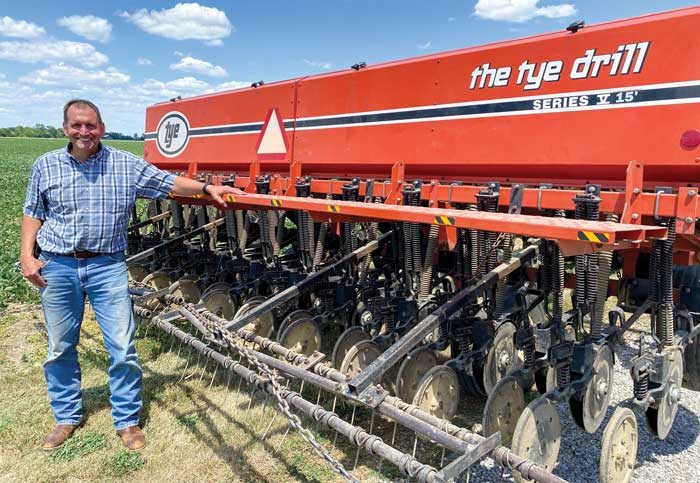No-Till Farmer
Get full access NOW to the most comprehensive, powerful and easy-to-use online resource for no-tillage practices. Just one good idea will pay for your subscription hundreds of times over.

OLD RELIABLE. Dusty Sonnenberg likes his 15-foot Tye no-till drill because it’s “foolproof” and does well in adverse soil conditions. “But the thing I don’t like about it is it’s more of a controlled spill than controlled planting. If we pick up more acres, I’d like to get a no-till soybean planter that we can do more precision planting with,” he says.
Dusty Sonnenberg refers to himself as a first-generation farmer on a fifth-generation farm. He grew up on a farm in Hamler, Ohio, that was originally purchased by his great, great grandfather but moved after his parents sold it when he was in junior high school
About 20 years after graduating from Ohio State, he bought the property back and has the farm up and running once again.
Livestock is the primary driver for Sonnenberg, who runs a replacement dairy heifer operation (800 dairy heifer calves), raises dairy steers for freezer beef, no-tills soybeans, wheat and alfalfa, and sometimes strip-tills corn.
When Sonnenberg’s not running his Tye no-till drill or Orthman strip-till unit, he’s pounding pavement across the Buckeye State as a broadcaster for the Ohio Ag Net. He encounters a bevy of innovative ideas, strategies and experiments during his travels. In his own words, here are five takeaways from his broadcasting odyssey that will influence the way he no-tills in 2023.

NO-TILL SOYBEANS. Using his 15-foot Tye no-till drill, Sonnenberg no-tills soybeans in 7.5-inch rows in mid-May at a seeding rate of 180,000. He shoots for an average yield of 65 bushels per acre.
“I heard a lot about the use of biologicals. I am interested in a soybean-based seed lubricant ‘dust’ (to be used instead of talc or graphite) that has biologicals incorporated into it to get onto the seed or into the seed trench. It sounds promising.”
“Both were hot…